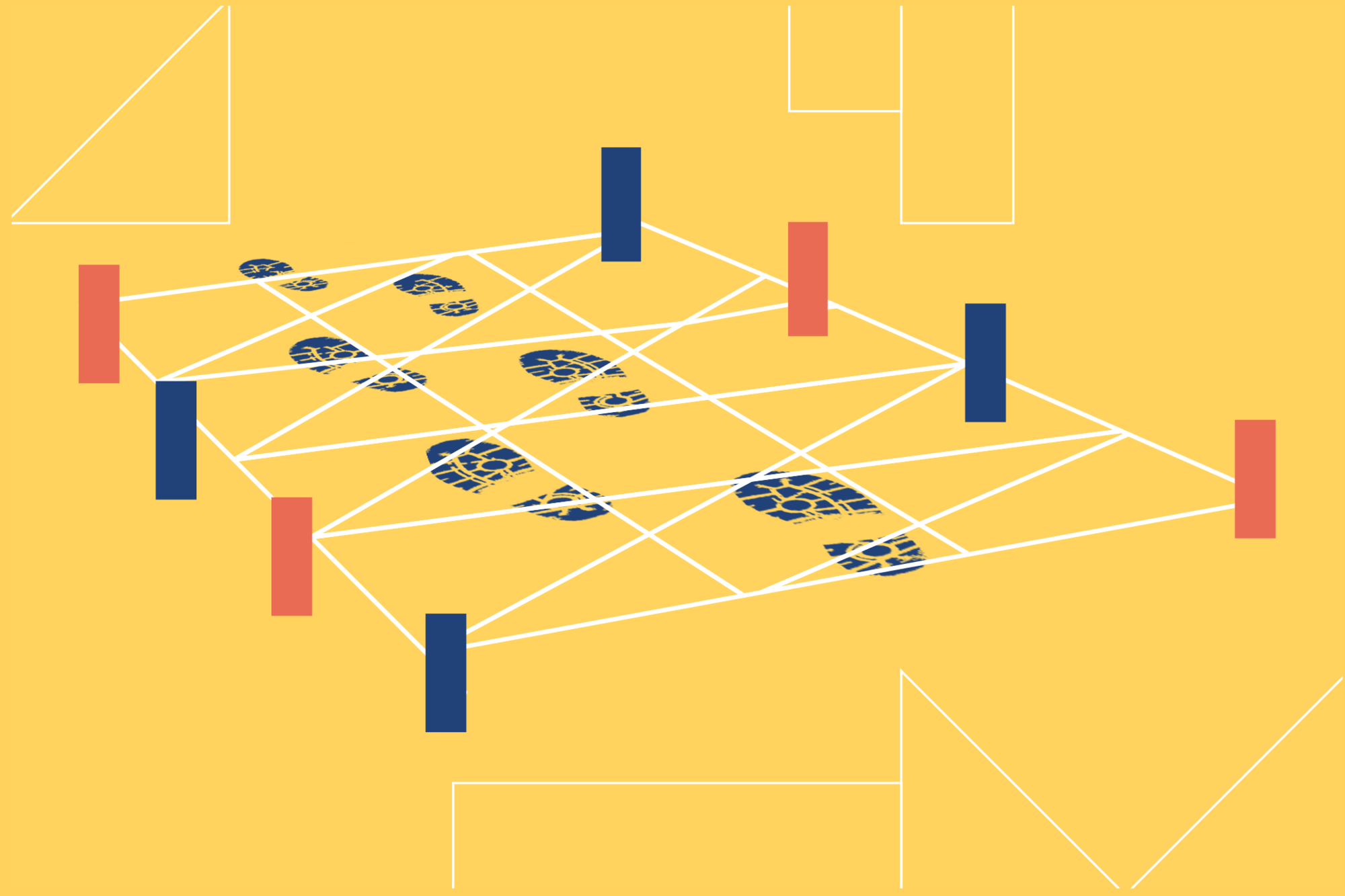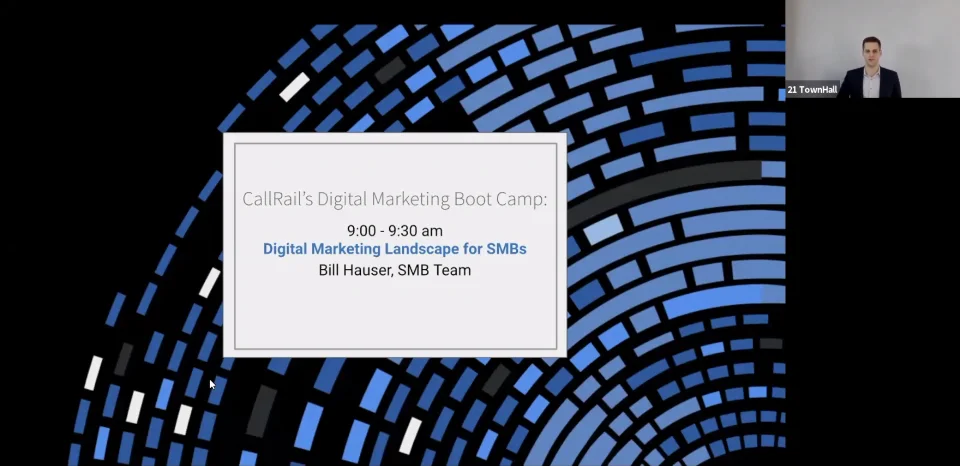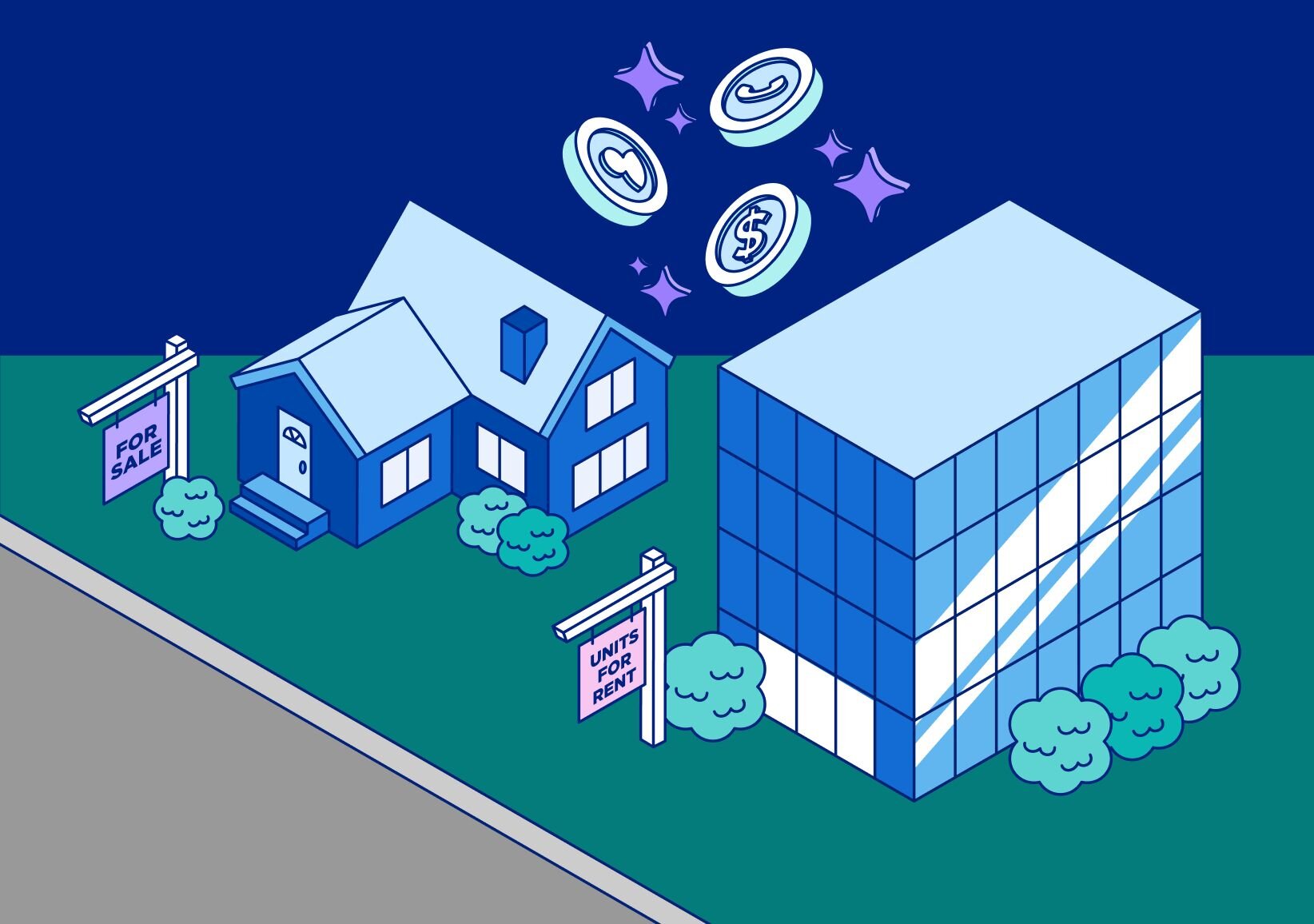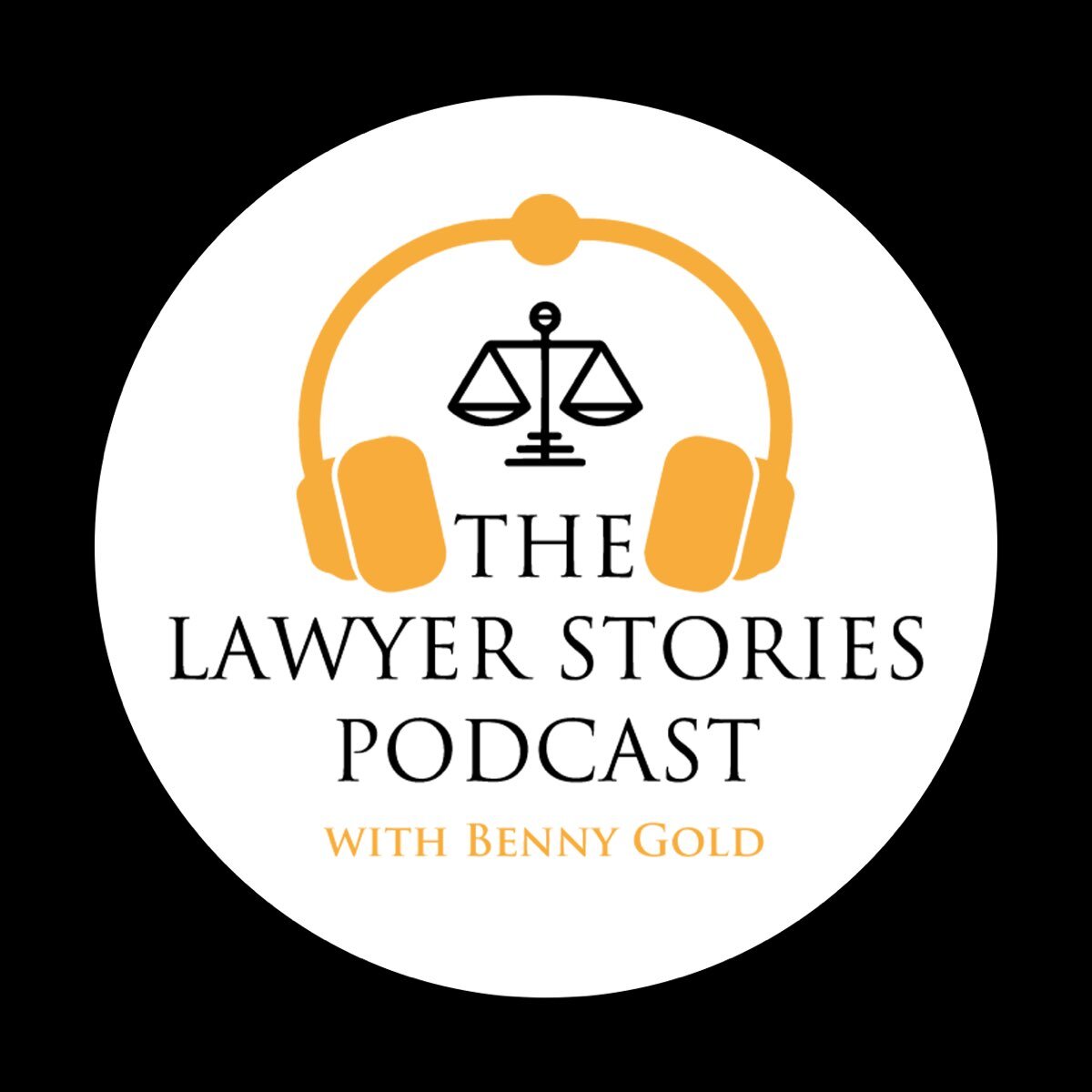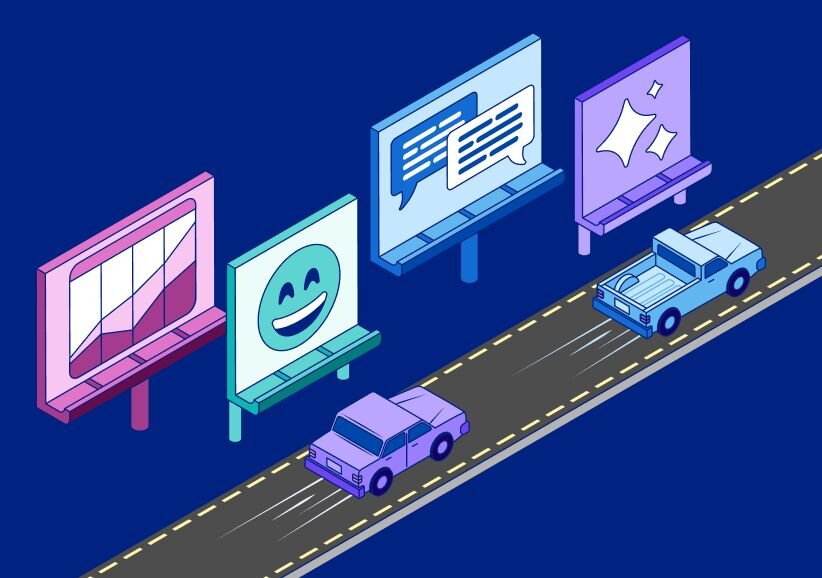Digital Marketing Boot Camp, Session 1: Bill Hauser of SMB Team, shows us the lay of the digital marketing land and how to create a thriving business that can weather any terrain.
SESSION TRANSCRIPTION
Introduction
My name is Bill Hauser from SMB Team. And to kick off the digital marketing boot camp, we will go through the 2020 Digital Marketing landscape for SMBs. And when I say SMB, I mean small to medium-size businesses. Today, we will go through some of the biggest changes happening in digital marketing and how you can capitalize.
We’re going to dive into:
- Getting traffic
- Focusing on conversions
- Multi-channel magic
And that is the multiplier for all of your marketing. Stay tuned till the end because at the end, the multi-channel strategy is going to tie all of this together when we talk about traffic and conversions for your business in 2020.
Backstory: How I got into marketing
Before I go into the weeds, I want to talk to you a little bit about my story and why I'm so passionate about digital marketing. So I already went through what we will cover about traffic, conversion, multi-channel magic, and I will explain the customization curve problem, which is one of the biggest problems for SMBs in their marketing.
So 2007, was the peak of my adolescence. I grew up racing dirt bikes, and my whole life I trained to get to Nationals. And in 2007, I qualified. I was one of 40 people in the United States to qualify for motocross nationals. And life was amazing.
And in 2008 three months after I qualified for nationals, I was down in North Carolina. I live in Philadelphia. We go down south in the winter to train because it gets cold in Philadelphia, too cold to ride. So I'm in North Carolina, and I hit this 150ft foot jump on my dirt bike and the bike falls from under me and II faceplant to the ground, and I break two vertebrae in my back.
I went from the highest of highs to the lowest of lows in 2008. And then a couple of months after that my family business failed. And as you know, financial problems being the number one cause of divorce, it led to a chain of events in my family, because quite frankly, we weren't recession-proof. And this is what motivates me so much to help businesses because I want to create recession proof companies.
So 2008 a couple of months after me breaking my back, I ended up walking in on my dad with another woman. And it was because he was trying to escape the fact that we were $800,000 in debt and he didn't share that with my mom and I.
And over the course of the next three months after I shared that with my mom, being an only child, everything we had was ripped from under us. Our house was repossessed, all my dirt bikes were repossessed. Everything I owned was taken from me because we did not have a recession-proof business.
And here's how I got into marketing: after two years of not talking to my dad from that day, he called me and I hadn't talked to him for a long time. And called me and he said, "Bill, I can't believe you told mom what happened." And he was blaming me for what happened and I freaked out at him on the phone and I hung up the phone. And I came to find out about two days later that he was holding a gun to his head when he was on the other side of that phone. And I didn't know that and he was in the middle of New York in the woods.
And thank God that day, he wanted a second chance to build his business. And he turned to the woods behind him and shot every round of that gun out into the woods. And from that day, he made a commitment to never put his family in that situation again. And a couple years go by, you know, I'm in college at this point. I reached out to him to bury the hatchet. And I say, "You know what, Dad, I want to work on your marketing. I'm going to learn marketing, so we don't make the same mistakes we made in 2008. So we don't contract again."
So I reached out to him, I learned how to build a website. I learned how to film an intro video for him and lo-and-behold, I created a Google Ads campaign for him. And after him making only like $50,000 a year for three years, I landed him a $200,000 job in five days from creating a Google ad campaign for him.
From that day, when I built that Google ad campaign, I've been operating from a place of passion to make other businesses, other business owners never feel the pain that I went through.
Because you can create a recession-proof business, but you have to do the right marketing strategy for your firm for your business, for your practice, whatever business you're running, you have to commit to aggressive marketing. You have to expand when everyone else is contracting.
Getting the right traffic
The first thing I'm going to go into is the customization curve problem. And I believe this is the number one problem in small business marketing.
The lower the marketing budget you have, the more customization and creativity you need to get an ROI from your marketing.
Not everyone has this unlimited budget, right? If you're not one of the biggest businesses in your niche or in your market, you don't have an unlimited budget. You have to find arbitrage opportunities in your market. And that requires knowledge. You have to learn what platforms you're going to go all-in on first. And then you have to learn a couple, you know, little tricks and tips on those platforms so you can find low-cost traffic.
So customization is expensive, right? If you don't have the knowledge on how to customize your marketing, you're going to fall into what we call the “spray and pray method” where you just spray your ads out to everyone in your market and pray that your ideal client is going to see your ad. But we all know that almost never happens.
You can't be blind with your marketing. And that's why you have to go after the right traffic, okay? And traffic costs are increasing. So sometimes when I speak, I always ask people "Raise your hand if your cost per lead is decreasing year-over-year." And everyone never raises their hand because traffic cost is increasing year-over-year. And you have to find ways to either:
A) Spend more than anyone else in your market
OR
B) Get more creative than everyone else in your market
If you can spend more time, money and creativity, to get clients than your competitors, you will win. You have to think of your business model. Russell Brunson, Ryan Deiss. All these guys are famous for saying that if you can find a way to cover your cost of customer acquisition with a foot in the door offer, this is why a lot of people sell ebooks for $97 to cover their cost per lead on Facebook so that essentially your marketing budget is subsidized by your foot in the door offer.
There is so much opportunity if you create a business model that allows you to spend more than your competitors. I think rather than contracting and trying to spend less, yoin 2020 should be to spend more than any of your competitors because your business model is so good that you can spend an unlimited budget in your market because you're capitalizing on ways to have your customers subsidize your marketing.
Balance target marketing with awareness marketing
This is another big mistake. I talked about the “spray and pray” method. But you also want to stop being so protective and thinking, "oh, I just want to show my ads to the perfect client. And I'm not going to engage in any form of marketing unless it's going to go right in front of my ideal client."
The reality is, you're not going to find arbitrage opportunities if you're worried about showing your ad to the 0.00001% of your target market. It's not smart, you have to balance target marketing with awareness marketing using social media, which I'll go into. What I want to go into is the most important things to be thinking of per platform. We're going to have six or seven other speakers who are going to go into each of these in detail, but I wanted to give you some of my thoughts as to what is most important per platform on the paid advertising side, and then on the organic marketing side.
Master your negative keyword strategy
The first thing on Google—the most important thing for paid Google Ads—is negative keywords. Google just expanded their definition of what they're called close variant keywords. What that means is, even if you do an exact match keyword for remodeling company near me, or personal injury lawyer, your ad can still show up for irrelevant searches. So the most important thing for you to master on Google Ads is your negative keyword strategy, because that's going to allow you to alleviate wasted clicks for clicks that would never result in business anyway.
Own your lead data
Next is Facebook. You need to own your data. I think it's in April, Facebook's audience network is going away. This is such a big disruptive change in social media marketing because of all the concerns with privacy, Facebook is literally removing their audience network.
The number one asset that you can have in your marketing strategy on social media is owning your data. You have to own your client data, your lead data, you have to be pixeling everything you're doing so that you can upload that information, you can upload your email list into Facebook and create your own audiences because the audiences as we know them are falling from our fingertips.
Build your Youtube strategy
Next is YouTube. I say "Just do it." If you guys are looking for advice on a YouTube strategy, please check out my company, SMB Team. The reason I think you should check it out is because we're only really seven months into it and we've already gotten 550 email opt-ins directly from YouTube from something we started seven months ago.
We have a pretty low number of subscribers. I got 200 leads last month, primarily from YouTube and I barely have that many subscribers. And I think a lot of people when they're embarking on a new marketing initiative, they think they need to compare themselves to the giants, study the people that have millions of subscribers. But you have to take that first step. I am in the trenches right now with YouTube.
So if you are looking for some inspiration to build up your YouTube strategy, just type in SMB Team, that's my company, and look at what we're doing. It's working tremendously. We're going after strategic keywords. It's cheap, and I will explain how it ties into the multi-channel magic at the end.
Linkedin is a must
With LinkedIn, you have to be a first-mover. You have to capitalize on LinkedIn for the paid side. You have to engage in LinkedIn in some way. We use paid ads on LinkedIn. We show them to people with very specific job titles.
It's the only way we've found that you can guarantee to get your ads in front of the right people because on Google Ads, you can never guarantee yourself who's going to be typing in the keywords that you're bidding on.
You can't control what a person's hands are typing into the keyboard. But on LinkedIn, you can only show your ads to people who have a specific job title, whether that's SEO, whether that's a decision-maker, etc. And retargeting is the best method—the only method for paid nurturing. We have seen tremendous success spending $5 a day to retarget to our website traffic and show them customer testimonials and stuff like that.
If you aren't retargeting, set up a low budget campaign, upload a customer testimonial and do it because that's only going to cost you pennies on the dollar compared to your overall marketing budget.
Foolproof organic strategies
#1 Video SEO
We talked about paid marketing. Now let's go into YouTube which I already talked about. This is the platform that if you are in a position to invest one or two years of your life into the dark age, as Bill Gates called it. The 10 dark years he worked every day in his office and slept under his desk.
That is what YouTube is, unfortunately, but that two-year time window when it really takes to get your YouTube videos to organically rank is such a barrier to entry that I know in another year and a half, our YouTube channel will1 be organically poppin’ as they say.
#2 Facebook and Instagram stories
Since my company is primarily a Google Ads management company, that's 75% of our business. I found that the number one problem people have through Google Ads is trust, right? You're just another ad that they ended up calling.
Sometimes we'll get super skeptical phone calls from our Google Ads. And I'll go, "you know, that's great." I'll send them to our YouTube. I'll say "hey, why don't you see the over 160 videos released on exactly the questions you're asking. We put everything out in the open. We have nothing to hide."
And then they go to our YouTube and the trust levels just go through the roof. The same thing happens on Facebook and Instagram. What we do is, when we get a lead that's qualified, I'll personally friend request them on Facebook, I'll personally follow them and ask them to follow me on Instagram. And I do anywhere between seven to twelve Instagram and Facebook stories every day.
Over time, I'll do inspirational posts. I don't talk about marketing on social media. Talking about marketing on social doesn't work, people want entertainment, people want inspiration. That's what attracts people to social. Social media, people go on Facebook and Instagram to waste time. So stop trying to make your marketing on these platforms productive for people. No, they want to be inspired and entertained. That's it. So just talk about things you're interested in. Don't make everything a pitch.
#3 SEO
How to make your SEO pay you now. I want to talk about how we did that. We all know that the importance of power pages is growing. A power page as we define it at the SMB Team is a long, information-filled article, like everything you need to know to type a blog or article. We did this for lawyer PPC, we created something that's called the lawyer PPC playbook. And from getting our website two-and-a-half years ago, buying our domain, now, we're already ranking after a blog that we released maybe about five months ago third through fifth on the first page of Google for a large number of lawyer PPC Google adverts for lawyers type keywords, which is a big niche that we serve.
How do you make your SEO pay you now? Because if you put up a power page, it should take years for that to rank on page one if you don't have a high domain authority. Well, here's what we do. We package our long blog posts into ebook form. And then we create a PDF we push out a social campaign that drives to that blog to increase the traffic. We get paid. We get leads now by sending traffic to our power pages, offering an ebook PDF version of it, capturing that email nurturing them on a daily email drip sequence.
By the way, when we talk about multi-channel magic, email is the most important part of this whole plan, I'll explain why. You can get your SEO to pay you now for pennies on the dollar by doing very low budgets on Facebook sending traffic to your power page with an ebook backup.
So we have LinkedIn. I think the best way is not to do this crazy organic strategy on LinkedIn. I know Gary Vee is big on posting a million times a day on LinkedIn. I think it's more about a connection with your prospects. I mean, a literal connection, right? Connect with your prospects on LinkedIn, but also comment on their posts, engage with them on LinkedIn, send them messages on things you find are interesting. That works way better than blind organic posts.
And then lastly is Tik Tok. I mean, I have a friend who I grew up with, who already has millions and millions and millions of views on Tik Tok doing lawyer videos, lawyer tips, you can check him out at Top Dog Law. And you can be a first-mover on Tik Tok. I will tell you this, the geo-restrictions on it are not set up well just yet. So if you get viral on Tik Tok, you will be showing up in tons of countries probably outside of where you serve. It's more of a mass awareness platform right now.
Conversions
The next thing I want to talk about is conversion. We've spent a lot of time on traffic. After you get traffic, it becomes conversion time, baby. This is where all the money is made. Do you want to convert leads just by having a great sales process? Well, yeah, that's important. You can be “Wolf of Wall Street” on every lead that you get and just not be smart with your conversion funnel and just depend on crazy follow up. But I think there're ways to work smarter than just that intense.
Seven out of ten callers will hang up if they reach your voicemail and move on to the next option.
The reason this is important for you to know is there are so many options nowadays. You are spending so much money to get a lead, not just the cost on the ad platform, but the time, the energy and quite frankly, your service is your brand.
All the money you're spending on improving your service, improving your customer experience, all comes to this pinnacle moment when finally someone reaches out to you. What are you doing when someone reaches out to you? Are you sending them the voicemail? Are you treating it like a referral call, like a call from a family friend who was referred to you from, you know, Mama Joe or whatever someone in your family? I mean, it's stupid.
You have to prioritize your sales process. Don't get me wrong, there's ways to do this smarter.Before that though, there are two steps to the conversion process:
So before that though, there are two steps to the conversion process:
- Click to call: This is where CallRail helps a lot because you can track everything from click to call.
- After that phone call, how many convert into an actual client?
After that phone call, how many convert into an actual client? We found the best method for all paid advertising sources is the landing page. If you're not using landing pages, and you're sending all of your traffic to the homepage of your website, you're making a big mistake, wasting a ton of money. Get landing pages made.
Your brand is your service. So I'm going to flip this on its head, your brand is your service and your service is your brand. These are two different thoughts. Your brand, the amount of value you give in the marketplace, before someone ever tssacting will going to impact the perception of your service.
Are you getting value in advance? Or are you just depending on immediate snap lead generation things where you get calls and you give no value to people in advance and ask them to sign your contract?
Give value in advance. The way I do that is through YouTube. The way you do that is up to you. But it gives the potential client a perception that you are a thought leader and they come into working with you with a positive intention on how the relationship is going to go.
Your brand is your service, but also your service is your brand, meaning if you have bad service that's going to come back and hurt your brand.
You have to get both sides of this handled. So, multi-channel magic, right? I was talking about how to tie all of this together. And one quick point I want to make before I move on to multi-channel magic, improving sales process, hiring answering service, do whatever it takes to make sure your leads are handled. Okay, glad I made that clear.
Multi-channel magic
Your competitors aren't taking advantage of a multi-channel marketing approach. I want to use us as a case study on multi-channel marketing. Since we are primarily a Google Ads management company for small to medium-sized businesses, my company is called the SMB Team. Since we are Google Ads focus, that's what we do for ourselves. It's how we get 80% of our clients through our own internal Google Ads campaigns, but we use multi-channel to build trust from those platforms.
A big takeaway here before I go into this is to commit to one major platform. My company is committed to Google Ads. Everything else is what I call the multi-channel multiplier, right? But you have to focus on one platform. I have a mentor and I'll say to him, "oh, this guy had all this success on this one platform." He'll always go, "Yeah, that's great. You'll have success if you commit to any platform."
The problem is committing to one platform and then creating a multi-channel ecosystem around that platform. For us, it's Google Ads. What happens is, we'll show ads for when lawyers or contractors or different niches of business type in Google Ads management for and then insert their industry. A lot of our ad dollars get spent towards lawyers since that's a big niche of our business.
What we do is after that Google Ad lead comes in, we found that trust is the biggest problem. What we'll do, and we've analyzed this in Google Analytics, is we know that people are going to see our Google Ad, call us, they're going to do a branded search. They're going to type in our business name, and then the word “reviews.” “SMB Team reviews.” They're going to make the first phone call, and they're going to be skeptical.
So here's how we use multi-channel magic.
I add them to our email nurturing, which ties into over 160 videos we have on YouTube, and gives them valuable content every day to their inbox: marketing tips, leadership tips, whatever is on our list depends on what list you're on to get valuable stuff to their inbox every day.
In that email, they can click to our YouTube channel. They can binge our content, which happens frequently. Then we'll add them to our drip sequence. They'll get some value there, they'll see our YouTube videos, I'll add them on Facebook, and I'll do daily Facebook stories.
And literally this past week, I had someone who was on the fence see my Facebook story about how every day, I write my goals and gratitudes, read my major definite purpose statement from “Think and Grow Rich” and meditate.
He reached out and said, "You know, I really love what you're doing. I want to work with someone like you." It had nothing to do with our service and everything to do with the person. People buy from people they know, like and trust.
That's one example. Another one, which I already explained, is creating a power page, a big long blog post, repurposing that into an ebook, running Facebook ads to that ebook, then having an email nurturing campaign after that, which then leads to a phone call and then reaching out to us with trust.
That's how you can make your SEO pay—by doing low-cost Facebook ads to long blog posts that people can enter their email into. If you want to see an example of this, Google "Lawyer PPC Playbook" and see how we're doing this. We have a call to action on the page, and we got 200 leads last month from that.
And then lastly is the thought leadership funnel where again, we've committed to Google Ads as our main source of traffic. They go to a landing page; they reach out; we put them in our email drip, then they’re introduced to our YouTube videos. They binge on 10 or more of our YouTube and say "I love your content. I love what you're putting out there. I want to work with a company like you."
This is how multi-channel magic works.
You need to commit to one platform with all of your time, energy and attention. And then you need to create one to three multi-channel strategies that nurture your leads with more trust, to the point where they are thinking, "Why was I skeptical towards this company? I need to move forward with them."
Another way to do multi-channel magic is to give free offers. Subscribe to our YouTube channel. Follow me on Instagram @billhauserbusiness, and if you go to our website, SMBTeam.com, put in your email, and you'll be added to our daily email sequence. You could literally just copy exactly the strategy that we're doing. That’s my free offer to you right now.
Digital Marketing Boot Camp Schedule:
- Session 1: Digital Marketing Landscape for SMBs | Bill Hauser
- Session 2: SEO, Local Search & Google my Business | Jordan Polhemus
- Session 3: 5 Critical Components for Facebook Dominance | Adam Arkfield
- Session 4: The Basics of Email Marketing | Margaret Hamner
- Session 5: 5 Steps for Social Success | Megan McMullin
- Session 6: 5 Google Ads Concepts for PPC Success | Adam Arkfield
- Session 7: Optimize your lead generation strategy | Jonathan Naccache
- Session 8: Foundations of Data Analytics | Jenny Bristow
- Session 9: Understanding Marketing Performance with Comprehensive Reporting | Tony Lael



